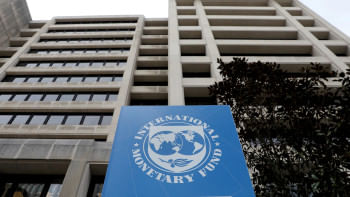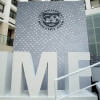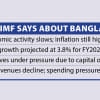IMF sets new loan conditions

The International Monetary Fund has set new performance criteria tied to Bangladesh's $5.5 billion loan programme, requiring the country to significantly reduce both domestic and external arrears in the power and fertiliser sectors before the next tranche can be released.
Under the revised conditions detailed in the IMF's latest programme report released yesterday, the government must cut external payment arrears in the power and fertiliser sectors from $870 million in June 2025 to $562 million by December, and further to $254 million by June 2026. Simultaneously, domestic arrears in these sectors must be halved from Tk 28,000 crore in June to Tk 14,070 crore by December, and brought down to zero by June 2026.
"External payment arrears have surfaced, notably within the power sector's state-owned enterprises, driven by limited foreign exchange availability and outstanding domestic subsidy arrears owed by the central government to the SOEs," the IMF said in the report.
In a shift with broader implications, the IMF has elevated these arrears clearance targets to the level of quantitative performance criteria, the most binding form of conditionality in IMF programmes. Failure to meet them would require Bangladesh to formally request a waiver from the IMF Executive Board before future disbursements can proceed.
Despite some improvement in the current account during the first half of FY25, the IMF warned that the broader external position has weakened. The emergence of arrears by state enterprises, a "substantial decline in FDI inflows", and large unrecorded capital outflows are expected to widen the external financing gap to $3.8 billion in FY25, significantly above earlier projections.
The IMF said the financing gap is expected to "remain substantial" through FY26-27. However, it said the pressure would gradually ease as capital outflows decline, supported by reserve accumulation and stepped-up financing from development partners.
In parallel, the IMF has also set a high bar for revenue mobilisation. The National Board of Revenue is expected to collect Tk 443,530 crore by June 2025 and Tk 550,700 crore by June 2026, an ambitious target that will require substantial improvements in tax compliance, administrative reforms, and reduction of exemptions.
The targets for net international reserves (NIR) have also been revised upward. Bangladesh must raise NIR from $17.4 billion in June 2025 to $19.9 billion by December, and to $22.41 billion by June 2026, as the IMF emphasises rebuilding external buffers.
The IMF programme includes three levels of conditionality: prior actions, indicative targets, and performance criteria. The latter are legally binding within the arrangement, and failure to meet them halts disbursements unless the IMF Board approves a waiver based on corrective action.
The tougher conditions come as Bangladesh faces a confluence of challenges -- from high inflation and sluggish growth to US tariff pressures on key exports.
Analysts say that tying state enterprises' arrears and tax revenue to performance criteria reflects the IMF's growing concern over fiscal slippage and the risk that mounting subsidy burdens and underperforming state enterprises could derail macroeconomic reforms.

 For all latest news, follow The Daily Star's Google News channel.
For all latest news, follow The Daily Star's Google News channel. 








Comments